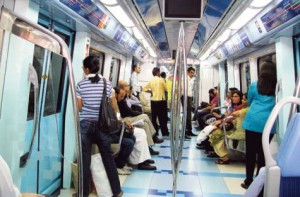By Ashfaq Ahmed gulfnews.com
Five additional Metro services will help accommodate 30,000 more passengers
 The Dubai Metro will increase the number of trains during peak hours to cope with the increasing rush of passengers.
The Dubai Metro will increase the number of trains during peak hours to cope with the increasing rush of passengers.
“With the increase in trains, headway between trains during peak hours will be reduced from six minutes to five minutes to help passengers get more trains at shorter intervals,” Ramadan Abdullah, Director of Operations at the Rail Agency of the Roads and Transport Authority (RTA), said.
In an exclusive interview with Gulf News, Abdullah said they already put more trains into service during peak hours if they become too crowded.
“We are planning to add at least five more trains, bringing the total number of trains on the Red Line to 27 during peak morning and evening hours,” he said.
Currently, 22 trains operate during peak hours with headway of six minutes and at least 16 during off peak hours with headway of eight minutes. The addition of five more trains will help accommodate at least 30,000 more passengers a day.
“We have to meet the increasing demand of commuters as the Metro is getting popular with every passing day with the number of passengers jumping fast,” he noted.
An average of 170,000 commuters are using the Metro every day while there were 140,000 just a few months ago. “Our target for this year is to have at least 190,000 passengers per day and we are very confident to achieve it,” Abdullah said, adding that the ridership is set to increase even further with the opening of the Green Line later this year. The Metro recorded a 10 per cent increase in the number of commuters during the Dubai Shopping Festival (DSF), which concluded on February 20.
Punctuality
He said the RTA is making a lot of effort to attract more people to use public transport, especially the Metro and public buses.
“Continuous educational campaigns in schools, colleges, private and public sector departments and road shows have helped a lot to change people’s mindsets, convincing them to leave their private cars and use the public transport,” he noted.
He said that some 30 per cent of Metro users are car owners. “Train punctuality which is more than 99.2 per cent has also helped built commuter confidence as now they easily calculate their travel time,” he added.
Abdullah, however, was a bit concerned about the low percentage of Metro passengers using the feeder buses.
“The transfer ratio between Metro and buses is not very high as only 15 to 20 per cent of Metro users are using the feeder buses,” he said. The RTA is working on plans to educate people on the use of the integrated public transport system. “There is a need to educate more people about the use of public buses in collaboration with the Metro,” he said.
The number of Metro passengers is also expected to increase sharply from March as the RTA is set to launch special discounted fares for students and senior citizens while special needs people will be offered free rides. The RTA will also launch a ‘Daily Red Ticket’ which is a day pass worth Dh14 and can be used for unlimited travel on public transport in a day.
The RTA will start receiving applications from students, senior citizens and special needs people starting March. The minimum age to qualify for the senior citizen travel card is 60.
Only UAE nationals qualify for senior citizen cards as expatriates will not be issued this card. However, students and special needs discount cards are available for all nationalities.
Applicants who qualify for the special categories will have to apply for a Nol Blue Card which is a personalised card with the photo of the user.
The cost of the Blue Card is Dh70 including Dh20 credit and it can be recharged online, through banks and at the Metro and bus stations.
Nationality division of the Dubai Metro users
- Asians 55 per cent
- Expatriate Arabs 25 per cent
- Westerners 10 per cent
- UAE Nationals 7 per cent
- GCC nationals 1 per cent
- Others 3 per cent
Age Group of Dubai Metro users
Age group 21 to 30 years: 56 per cent
- 31-40 years: 29 per cent
- 41 to 50 years: 8 per cent
- 51 to 60 years: 4 per cent
- Less than 20 years: 4 per cent
Education level of the Metro users
- Bachelor degree holders: 63 per cent
- Masters degree holders: 10 per cent
- Diploma holders: 15 per cent
- High school certificates: 12 per cent
















